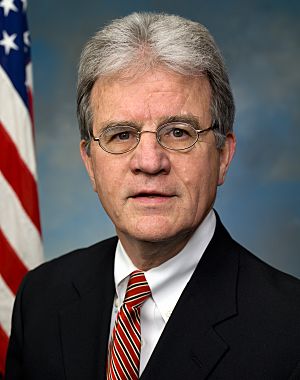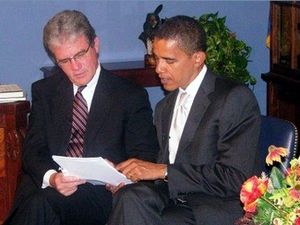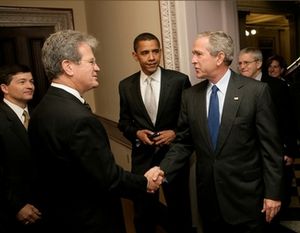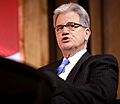Tom Coburn facts for kids
Quick facts for kids
Tom Coburn
|
|
|---|---|
 |
|
| United States Senator from Oklahoma |
|
| In office January 3, 2005 – January 3, 2015 |
|
| Preceded by | Don Nickles |
| Succeeded by | James Lankford |
| Member of the U.S. House of Representatives from Oklahoma's 2nd district |
|
| In office January 3, 1995 – January 3, 2001 |
|
| Preceded by | Mike Synar |
| Succeeded by | Brad Carson |
| Personal details | |
| Born |
Thomas Allen Coburn
March 14, 1948 Casper, Wyoming, U.S. |
| Died | March 28, 2020 (aged 72) Tulsa, Oklahoma, U.S. |
| Political party | Republican |
| Spouse |
Carolyn Denton
(m. 1968) |
| Children | 3, including Sarah |
| Education | Oklahoma State University–Stillwater (BS) University of Oklahoma (MD) |
Thomas Allen Coburn (March 14, 1948 – March 28, 2020) was an American politician and physician. He served as a U.S. Senator for Oklahoma from 2005 until 2015. Before that, he was a U.S. Representative.
Coburn was elected to the United States House of Representatives in 1994. He was part of a big change in Congress called the "Republican Revolution." He promised to serve only three terms and kept that promise. In 2004, he ran for the U.S. Senate and won. He was re-elected in 2010. Coburn decided not to run for a third Senate term. In 2014, he resigned early because his prostate cancer returned.
Coburn was known as a "fiscal" and "social conservative." This means he believed in careful government spending and traditional social values. Some people called him "Dr. No" because he often used special rules to stop government spending bills.
After leaving Congress, Coburn worked with groups that wanted to change how the government works. He also wrote books about his ideas for fixing the government.
Contents
Early life and medical career
Tom Coburn was born in Casper, Wyoming. His father, Orin Wesley Coburn, was an eye doctor who started a company called Coburn Optical Industries.
Tom Coburn went to Oklahoma State University and earned a degree in accounting. In 1968, he married Carolyn Denton, who had been Miss Oklahoma. They had three daughters: Callie, Katie, and Sarah. Sarah later became a famous opera singer.
After college, Coburn worked as a manager at his father's company. He helped the Virginia branch grow a lot.
Later, after he had melanoma (a type of skin cancer), Coburn decided to become a doctor. He went to the University of Oklahoma Medical School and graduated in 1983. He then opened his own family medical practice in Muskogee, Oklahoma. As an OB/GYN doctor, he helped deliver about 4,000 babies. He was once sued for medical error, but the case was dismissed, meaning he was not found at fault.
Political career
Serving in the House of Representatives
In 1994, Coburn ran for a seat in the United States House of Representatives. He ran in Oklahoma's 2nd congressional district. He won the election, becoming the first Republican to represent that district since 1921.
Coburn was known as one of the most conservative members of the House. He often disagreed with the leader of the House, Newt Gingrich. Coburn felt that the Republican Party was moving away from its conservative promises.
He was re-elected twice, even though his district usually voted for Democrats. He kept his promise to serve only three terms and retired from the House in 2001.
During his time in the House, Coburn helped pass important laws. These laws included expanding healthcare options for seniors and making it easier to get cheaper medicines from other countries. He also wrote a law to help prevent the spread of AIDS to babies. This law was praised for being the first to focus on protecting infants from the disease.
Serving in the Senate
After three years away from politics, Coburn decided to run for a U.S. Senate seat in 2004. He won the election and became a Senator for Oklahoma.
Coburn's voting record in the Senate was very conservative, just like his record in the House. He was re-elected in 2010 with a large majority of votes.
On January 16, 2014, Coburn announced he would resign from the Senate early. This was because his health was getting worse due to cancer.
Using the Senate hold
Coburn became well-known for using a special Senate rule called a "Senate hold." This rule allows a single Senator to prevent a bill from being voted on quickly.
For example, in 2009, he put a hold on a bill that would help veterans. He also blocked a bill meant to help end fighting in Uganda.
In 2007, Coburn blocked two bills that honored Rachel Carson, a famous scientist and author of Silent Spring. Coburn disagreed with her views on insecticides like DDT.
Because Coburn used holds so often, the Senate Majority Leader, Harry Reid, tried to combine many of the blocked bills into one large bill. But that bill did not pass.
Coburn also initially blocked a law called the Genetic Information Nondiscrimination Act (GINA). This law aimed to stop discrimination based on a person's genetic information. He lifted his hold after a part he disagreed with was changed.
Whistleblower rights
Coburn was interested in protecting "whistleblowers." These are government employees who report wrongdoing by their employers. He believed they should be protected from punishment.
He supported a bill called the Whistleblower Protection Act. However, he placed a hold on the Senate version of this bill. His website even had a way for potential whistleblowers to report government waste and fraud.
Criticism of the National Science Foundation
In 2011, Coburn released a report that criticized the National Science Foundation. This report looked closely at how the foundation spent its money.
Committee assignments
During his time in the Senate, Coburn was a member of several important committees:
- Committee on Homeland Security and Governmental Affairs
- Select Committee on Intelligence
- Committee on Banking, Housing, and Urban Affairs
Political beliefs
Government spending


Coburn was well-known for fighting against what he called "wasteful government spending." He often pointed out projects he thought were unnecessary. For example, he tried to move money from a controversial bridge project in Alaska to rebuild a bridge damaged by Hurricane Katrina in Louisiana.
In 2006, Coburn, along with Senators Barack Obama and John McCain, helped pass a law called the Federal Funding Accountability and Transparency Act. This law made the government publish details about how federal money was being spent online. This helped people see where their tax dollars were going.
Coburn was a strong supporter of finding ways to save money in government. He even suggested freezing defense spending in 2010. He also worked to end a large government payment for ethanol fuel.
In 2013, after powerful tornadoes hit his home state of Oklahoma, Coburn said that any new money for disaster relief should be balanced by cuts in other government spending.
He also disagreed with the idea of shutting down the federal government to stop the Affordable Care Act. He called this strategy "doomed to fail."
Gun rights
Coburn strongly believed in the Second Amendment, which protects the right of people to own firearms. He was against any laws that would restrict gun ownership for law-abiding citizens.
He supported allowing people to carry concealed firearms in national parks.
After the tragic Sandy Hook Elementary School shooting in 2012, Coburn changed his mind and supported universal background checks for gun buyers. He worked with Democratic Senators to try and create a bill for this. However, these talks did not succeed, and he later voted against the final version of the bill.
Healthcare reform
Coburn voted against the Patient Protection and Affordable Care Act in 2009 and 2010.
He also helped write a Republican plan for healthcare reform called the Patients Choice Act of 2009. This plan aimed to give people more choices in health insurance and fight against Medicare fraud.
Presidential appointments
Coburn believed that the Senate should not block presidential appointments to judicial or executive branch positions. He felt that the U.S. Constitution clearly outlines how the President and Senate should work together on these appointments.
Same-sex marriage
Coburn was against same-sex marriage. In 2006, he voted to support a proposed change to the Constitution that would ban it.
War in Iraq
Coburn voted against funding the war in Iraq in both 2007 and 2008. In 2008, he said that he personally thought going to Iraq was "probably a mistake."
Life after the Senate
After leaving the U.S. Senate, Tom Coburn became a senior advisor for a group called Citizens for Self-Governance. This group works to call for a special meeting to propose changes to the United States Constitution. In 2017, he wrote a book about this idea.
He also worked with the Manhattan Institute for Policy Research to help make drug approval processes faster.
Awards
In 2013, Coburn received the U.S. Senator John Heinz Award for Greatest Public Service. This award recognizes elected officials who have done great things for the public.
Personal life
Even though they had very different political views, Tom Coburn was a close friend of President Barack Obama. Their friendship started in 2005 when they both became Senators at the same time. They worked together on laws about political ethics and making government spending more open.
In 2011, Coburn told Bloomberg TV, "I love the man. I think he's a neat man. I don't want him to be president, but I still love him." He said that even though they disagreed on most issues, they could still have a great relationship.
Before a big college football game in 2009, Coburn made a bet with Florida Senator Bill Nelson. When Coburn's team lost, he had to sing Elton John's "Rocket Man" to Nelson.
Illness and death
In November 2013, Coburn announced that he had been diagnosed with prostate cancer. He had also survived colon cancer and melanoma before this. His declining health led him to resign from the Senate in 2014.
Tom Coburn passed away at his home in Tulsa on March 28, 2020, two weeks after his 72nd birthday.
Books
- Breach of Trust: How Washington Turns Outsiders Into Insiders (2003)
- The Debt Bomb: A Bold Plan to Stop Washington from Bankrupting America (2012)
- Smashing the DC Monopoly: Using Article V to Restore Freedom and Stop Runaway Government (2017)
Images for kids
See also
 In Spanish: Tom Coburn para niños
In Spanish: Tom Coburn para niños
- Physicians in the United States Congress





